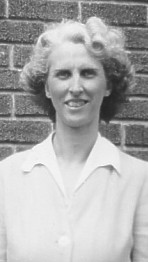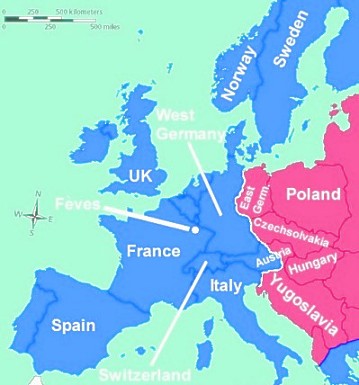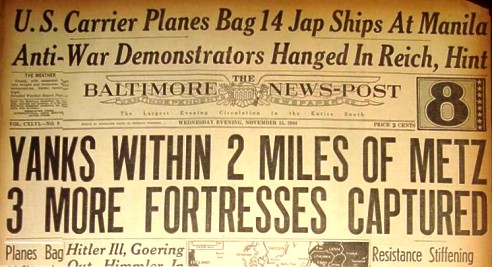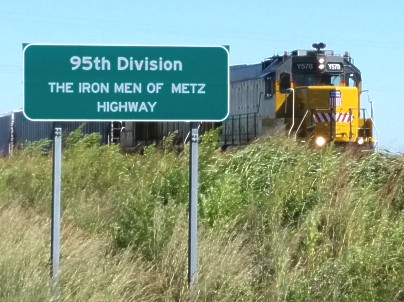One of the people who had gathered on Carson's porch on July 15, 1948 to choose a town for Morganville was Velma (Hahn) Young, director of music at the high school. Young told McKee:
Many of us didn't quite know why we were there that night with its wonderful crop of Kansas mosquitoes. Velma talked to us about the United Nations as a peace movement; that led around to what we could do. And it seemed the best thing was to single out some particular town and start there.
Velma (Hahn) Young was a
Morganville music teacher
After the war, the Soviet Union maintained its control over the territory it conquered. British Prime Minister Winston
Churchill coined the phrase "Iron Curtain" for the dividing line between these lands and the
free countries to the west.
"At first we thought we'd like a town behind the Iron Curtain," said Young, "but we soon found we couldn't get
through the curtain."
Mrs. Josephine "Babe" (Conkright) Mellies told McKee, "My family was in favor of adopting an Italian town, for we were
corresponding with an Italian family and we liked them very much."
Carson recalled, "A firm voice had come from the corner of the porch: 'I will not give one nickel if you choose a
German town.'"
Map of Europe after WWII.
White line marks the Iron Curtain.
Morganville native Ed Schwab told McKee, "I wanted Fèves because it was a rural community about the same size as ours
and the destruction there was caused by our boys, not intentional, of course. We'd like to have their friendship to
offset some of the things done to them."
Schwab was referring to something more personal than just the American forces as a whole. The 95th Infantry Division
had joined Patton's army on October 14, 1944. While this almost-exclusively Midwestern group had never been in battle,
they were soon in the thick of it. By early November, they were stationed northwest of the Bois de Fèves, the tall
tree-covered ridge next to the village of Fèves. It was the 95th's three regiments that on the morning of November
15 quietly skirted the northeastern end of the ridge. The 378th Regiment captured Fort de Fèves and liberated the
nearby village.
Victories such as these were welcome news in the States
and yielded headlines. When Metz was liberated a month later, the 95th proudly accepted a name the Germans had
bestowed on them - "The Iron Men of Metz."
The men of the 95th were largely from Chicago, Indiana - and Kansas. Morganville son Lyle Bloom was a private in
the infantry that liberated the area around Metz.
Baltimore newspaper, November 15, 1944
Bloom, and others from the area who had served, were keenly aware what had happened in Lorraine and knew the
devastation in Fèves was, at least, in part, inflicted by Kansans.
In 2015, a Union Pacific train waits in a siding
near the "Iron Men of Metz" marker on U.S.
Highway 24 east of Topeka, Kansas.





